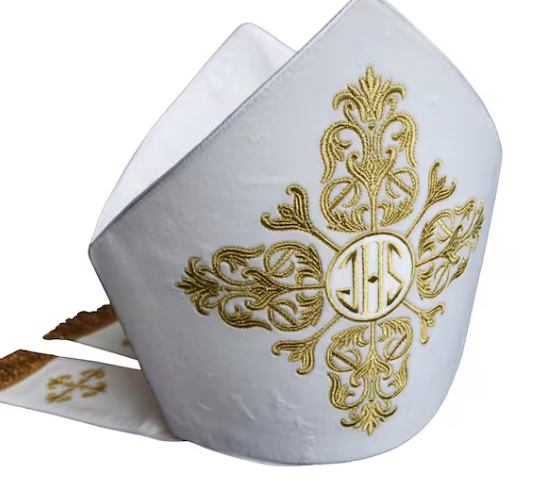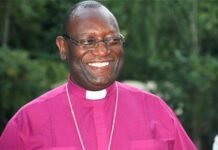An old classic move that sits amongst my DVD collection is a movie entitled Apolllo 13. It is a movie based on a disaster that took place during the Apollo 13 mission to the moon. A key line in the movie (which was also spoken in the real event, upon which the move is based) is the line, “Houston, we have a problem”. The problem originates with one of the ship’s oxygen tanks which was faulty and when the order was given to stir the tanks, it exploded. The ship suffered a catastrophic failure and the crew had to move to another part of the ship, and work hard not only to to return to Earth, but to stay alive. This famous line from the movie remind of a problem that faces the Anglican church, a problem of such magnitude that it needs to be said:
“Anglicans, we have a problem”.
Under the auspices of the province in which I serve, all our bishops:
- at certain times wear purple shirts
- ordain men and women to holy orders.
- made the same vows when they were ordained as Bishops.
- were exhorted to: Be faithful in prayer, diligent in the study of the Holy Scriptures so that [they] may be equipped to teach and encourage, and to proclaim to the gospel to all. To correct and set aside teaching that is contrary to the mind of Christ, both privately and publicly, urging all to live according to God’s Word. To put aside all ungodly and worldly behaviour, and live modestly, in justice and godliness, so that by [their lives] and example [they] may commend Christ’s truth.
- They publicly affirmed that they were convinced: that the Holy Scriptures contain all doctrine necessary for eternal salvation through faith in Jesus Christ and that with God’s help you will instruct from them the people committed to your care, teaching nothing as essential to salvation which cannot be demonstrated from the Scriptures.
- publicly declared stated: I firmly and sincerely believe the Catholic Faith and I give my assent to the doctrine of the Anglican Church (insert province) as expressed in the Thirty-Nine Articles of Religion, The Book of Common Prayer, and the Ordering of Bishops, Priests and Deacons: I believe that doctrine to be agreeable to the Word of God;
However:
“Anglicans, we have a problem!”
For within the province in which I serve there is a type of bishop who
- Believes in a different God – a God who is a God of love, and because of this, deem those living lifestyles that Scripture says are sinful are irrelevant because God is love. So, for example if two gay men who are married in the eyes of the law, it is therefore incumbent upon those in the church to bless them because God is love and God’s love overrules his other attributes, (i.e. Holiness, Righteousness,) and even overrules what He has said in His own Word because God is love. As one recently retired bishop in my province said: “This is a long overdue recognition that if God is love, and faithful persons are living together in love, then the church ought to bless those persons in the name of God,”
- Believes in a different Gospel – A gospel that consists of a half-truth that is presented as the whole truth. A gospel that has no repentance; a gospel “with a God without wrath bringing men without sin into a kingdom without judgment through the ministrations of Christ without a cross”. Again more bishop quotes: “It’s about inclusivity. It’s about God being God of all people”; “There are many gay people who are faithful Christians, who are living in the church”; “I hope that at least in this diocese it will mean that gay and lesbian Christians can be who they are; who marry under state law and be blessed and accepted in their church”; “‘God loves you and we love you and you are who you are, and that’s okay!’”
- Believes in a non-Biblical ecclesiology – where church is defined as a community of Christians and non-Christians who live together without distinction, without leadership or discipline (except their own top down leadership) or doctrine (except the denial of orthodox Biblical doctrine), trying to emulate the character of Jesus Christ without stressing the gospel requirements of repentance of sin and faith in Jesus that enable the life of Jesus to be lived by the power of the Holy Spirit.
- Believe that God’s Word is not God’s Word – and therefore it is to be interpreted through the lens of culture and subjective human reason. The last quote: “My own view is that there’s nothing in the Bible that understands the sorts of relationships that we are talking about, in this day and age.”
By way of contrast, there is another type of Bishop in the province in which I serve. Bishops who:
- Believe that the Bible is the Word of God and submit to its authority. Here are some quotes from these bishops: “Understanding the Scriptures requires you to listen to what God has said and to sit under his authority. Where a part of the Bible is unclear, we don’t ignore it but we look to the rest of the Bible to offer us further understanding”. “By contrast, interpreting the Scriptures makes you the authority over what God has said allowing influences such as tradition, reason, and experience to determine your thoughts”. Here is more: “Start with God and you start with the Almighty, the Sovereign, the Holy and Perfect. Start with humanity and every effort is flawed from the start by our creatureliness, weakness and fallen nature. It is hardly surprising that when we get God wrong, we get ourselves wrong. It is hardly surprising when we put ourselves in God’s place that we will compromise God’s absolutes”.
In a very insightful article, an astute observer wrote this about the province in which I serve:
“This week the General Synod of the (anonymous) Anglican Church has been debating what its stance is to be on human sexuality. A vote to affirm the church’s traditional position on marriage was strongly supported by clergy and laity but was narrowly rejected by the bishops. A split is looming, but in this, (Anglicans from this province) are not unique. In recent decades, Christian denominations across the West have been dividing along progressive versus conservative lines. Anglican Churches in Scotland and New Zealand have been impacted by this trend. In North America, denominations affected by splits include the Episcopal Church, the United Methodist Church, the Anglican Church of Canada, the Presbyterian Church (USA) and the American Baptist Churches USA. The trigger in all these cases has been whether the church will endorse same-sex unions. However, the fault lines run deeper than attitudes to human sexuality.
Existing throughout the Anglican communion are two irreconcilable and incompatible theological tectonic plates that are colliding, both of whom claim meaning, custodianship and therefore guardianship of the nomenclature, ‘Anglican’.
Recently at the National Synod of a province in the pacific, a key vote to affirm a Statement on Marriage as the union of a man and a woman was passed with a majority in the house of laity, (63 to 47), and a majority in the house of clergy (70 to 39). However, the house of bishops showed themselves to be in a very different place to most of the rest of the Synod (10 to 12 with two bishops abstaining). Thus, the motion was lost.
Amongst the ten bishops who disagreed with this motion, I wonder if they were aware that if it were a straight vote, they would have lost (145 to 96), but by voting in houses, they knew they had enough to vote against Biblical fidelity, to vote against the doctrine of Christ?
The outcome of that particular national synod reveals the two types of Bishops that exist and highlights the fact that:
“Anglicans, we have a problem!”
The bishops who are the problem may wear the same purples shirts, made the same vows when they were ordained as Bishops but that is where the similarities begin and end.
There is a very faithful bishop in the USA, named Julian Dobbs who said recently at a pastoral address to his diocese:
“We need courage to swim against the stream. Courage to resist the pressure to be politically correct. Courage to resist the pressure of wokeism. Courage to defend and proclaim the gospel of Christ crucified when it is increasingly unpopular in the church and courage to preach and declare this gospel once for all entrusted to the saints. The courage we need comes from Christ. He will sustain us”.
We also need courageous men to stand up and plead with our heavenly Father who will say to him “Here I am, send me”. Men who will become the bishops that the Anglican Church needs and rectify this problem. We must pray! Pray that God will raise up Godly bishops!
In short, we have too many bishops who lack what I call “The Four C’s:
‘character’, ‘competence’, ‘commitment’, and ‘calling’. There are too many bishops who do not have Christian character because they are unconverted. There are too many bishops who are not competent to teach and preach because they don’t believe God’s Word is God’s Word. (As the saying goes, “You cannot give away what you do not have”.) There are too many bishops who are not committed to Christ, his salvific work, his authority, his doctrine, because they believe in a different Christ to that of the Apostles, and there are too many bishops they are not called by God, as God does not call wolves dressed in sheep’s clothing to be in holy orders. In other words:
“Anglicans, we have a problem!”
We need bishops who are first and foremost Christians, who actually believe what they are supposed to believe, who meant what they said at their ordinations. We need bishops who believe and eagerly rejoice in our Anglican statements of faith, creeds, and confessions. We need bishops who do not and will not allow the heart of the gospel to be obscured by other matters — however laudable those other matters may be. We need bishops who will keep the gospel of the Lord Jesus Christ and the ministry of the gospel of the Lord Jesus Christ front and centre.
The Apollo 13 failure was a disaster, but they fixed the problem and made it home. It was a testimony to human ingenuity, grit, and determination. We need bishops who are made of the same stuff, bishops who can lead dioceses, priests and deacons, who can bring lost humanity to Christ and therefore to their true home.



